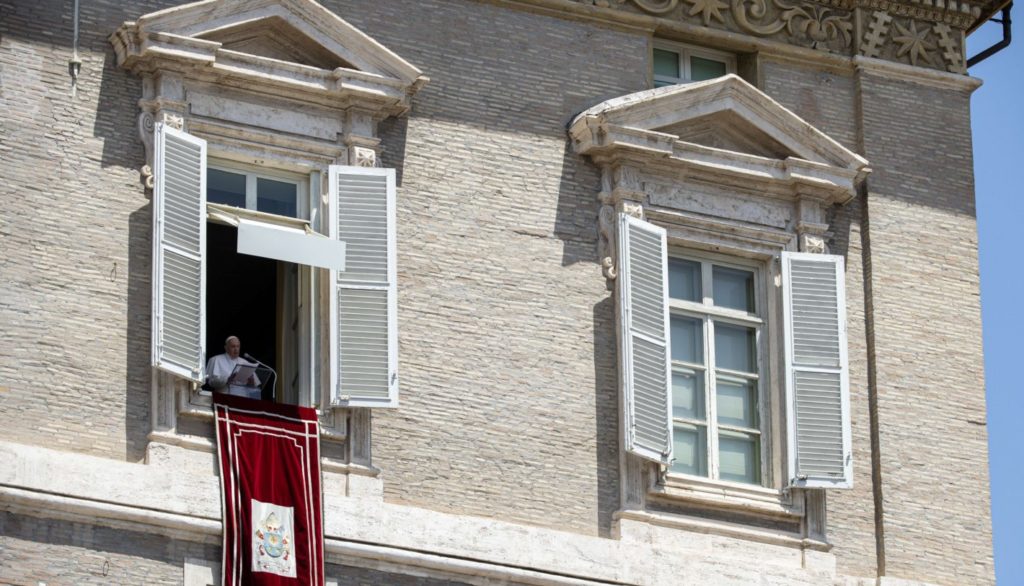After celebrating Mass on the Solemnity of Saints Peter and Paul in St. Peter's Basilica with the blessing of the Palliums for the new archbishops, Pope Francis prayed the Angelus from the window of the Apostolic Palace and commented on the Gospel. "In the central part of today's Gospel (Mt 16:13-19), the Lord asks his disciples a decisive question: "But who do you say that I am?" (v. 15). This is the crucial question that Jesus repeats to us today: "Who am I to you? Who am I to you, who have embraced the faith but are still afraid to put out into the deep in my Word?Who am I to youWho am I for you, who have been a Christian for a long time but, tired by habit, have lost your first love? Who am I for you, who are going through a difficult moment and need to shake yourself to continue? Jesus asks: Who am I to you? Let us give him today an answer that comes from the heart".
"Before this question," says the Pope, "Jesus asked his disciples another: 'Who do people say that I am?' (cf. v. 13). It was a survey to record opinions about him and the fame he enjoyed, but fame does not interest Jesus. So why did he ask that question? To underline a difference, which is. the fundamental difference in the Christian life. There are those who remain in the first question, in the opinions, and talk about of Jesusand there are those who, on the other hand, speak to JesusWe offer him our life, we enter into a relationship with him, we take the decisive step. This is what interests the Lord: to be at the center of our thoughts, to be the point of reference of our affections; to be, in short, the love of our life".
Francis said, referring to St. Peter and St. Paul, that "the saints we are celebrating took this step and became witnesses. They were not fansbut imitators of Jesus. They were not spectators, but protagonists of the Gospel. They did not believe in words, but in deeds. Peter did not speak of mission, he was a fisher of men; Paul did not write cultured books, but lived letters, as he traveled and testified. Both spent their lives for the Lord and for their brothers. And they provoke us. Because we run the risk of staying with the first question: giving opinions and opinions, having great ideas and saying nice words, but never putting it on the line. How many times, for example, we say that we would like a Church that is more faithful to the Gospel, closer to the people, more prophetic and missionary, but then, in practice, we do nothing! It is sad to see that many speak, comment and debate, but few give witness. Witnesses do not lose themselves in words, but bear fruit. They do not complain about others or the world, they start with themselves. They remind us that God is not to be demonstrated, but shownnot announced with proclamations, but witnessed by example".
"However," Francis continues, "looking at the lives of Peter and Paul, an objection may arise: they were certainly witnesses, but not always exemplary: Peter denied Jesus and Paul persecuted Christians. But, here is the point, they also witnessed their downfalls. St. Peter could have said to the evangelists: "Do not write the mistakes I have made". But no, his story comes out unambiguously from the Gospels, with all its miseries. The same goes for St. Paul, who in his letters speaks of errors and weaknesses. This is where the witness begins: from the truth about himself, from the struggle against his own duplicity and falsehood. The Lord can do great things through us when we do not care to defend our image, but are transparent with him and with others. Today, dear brothers and sisters, the Lord is questioning us. His question: Who am I to you?digs us up inside. Through her witnesses, Peter and Paul, she encourages us to take off our masks, to renounce the half-measures and excuses that make us lukewarm and mediocre. May Our Lady, Queen of Apostles, help us in this and kindle in us the desire to bear witness to Jesus".









